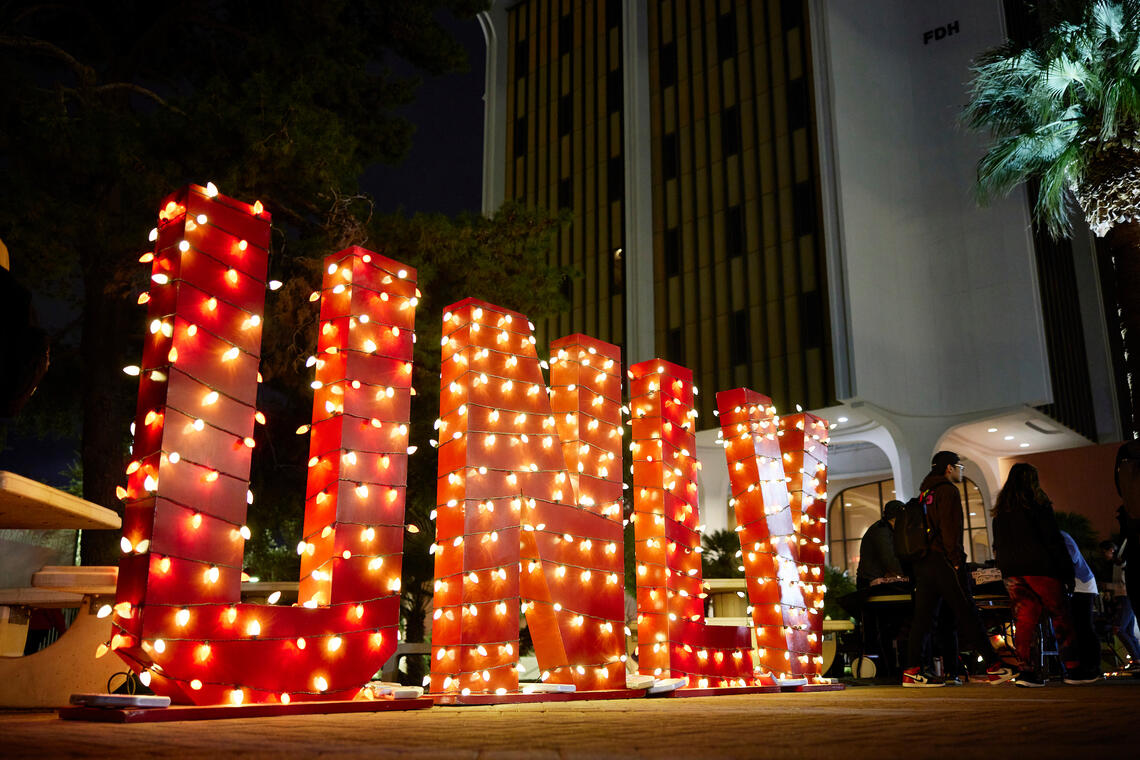
This has been a busy season at the Ombuds Office. I had originally planned to publish a post discussing the release of our 2022 annual report (indeed, it is mostly written), but due to a high level of volume of visitors and other work over the past week, the report isn’t ready to be released just yet. So instead, I would like to take a few minutes to share our experiences at the Involvement Fair.
The Involvement Fair, if you didn’t attend, took place on Wednesday, January 25, from 10am to 2pm. The crux of the event was offering Registered Student Organizations, UNLV departments, and non-profit community organizations an opportunity to advertise their services and meet with students. I and Tifara Rachal, the Ombuds Office’s Program manager, staffed our table, although Ms. Rachal deserves all of the credit for coordinating the details of our presentation, including visual displays, snacks, and plenty of postcards summarizing the role of the office. For our first experience “tabling,” we were remarkably well-prepared thanks to her efforts.
Our immediate neighbors can give you an idea of the range of participants. To our right, the Origami Club gave away folded paper cranes and wooed prospective members, while to our left representatives of the Academic Success Center provided information about the services they provide, and plenty of collateral for students. Both were quite popular.
Overall, the breadth and depth of the RSOs, departments, and non-profits pitching themselves to students was impressive, reflecting positively on the diversity of experiences that students can pursue at UNLV. Though it started as a colder day than many of us would have preferred, as the sun swung around FDH, it felt considerably warmer, and those staffing the tables and the students and staff walking among them seemed happy to be there.
Working the table gave me a fantastic, much-needed perspective. Some of the passers-by, particularly staff, had heard about the Ombuds Office, and a quick visit allowed them to learn more. But many had no idea what the office was, or that “ombuds” was an actual word. Side note if you are curious: it is a real word, adopted from the Swedish “ombudsman,” meaning representative. Second side note: the definitions given by Merriam-Webster refer to the work of a “classical ombudsman,” who is charged with receiving and investigating complaints, or an advocate ombuds, who advocates for individuals, and not an organizational ombudsman, who work with people and groups to help resolve concerns through informal avenues and who are specifically barred from formal investigations or adjudications.
Being able to quickly, accurately, and intelligently explain my profession is a challenge, and I think I have hit on a good formula: describe what we do, which is in essence listen to people and help them consider their options when facing a conflict; explain briefly the principles that underlay our work (confidentiality, independence, impartiality, and informality), and give a quick example of how we handle a typical concern brought to the office and the services we offer, including individual consultations, mediation, and group facilitation.
And, if I wasn’t good at summing up what an ombuds does in a few seconds before the Involvement Fair, if practice makes perfect, with a few dozen repetitions I think it’s getting there. I liked that the conversations, while they started from the same point, went in dramatically different directions. Some visitors posed hypotheticals, such as which circumstances would necessitate breaking confidentiality (in brief, the imminent threat of serious harm or disclosure of unreported child, elder, or animal abuse), while others were more interested in learning about how to involve the office in an on-going dispute.
One common question was, “What do people complain most about?” Those who have been reading for a while or seen one of my introductory talks might remember that communication with a supervisor is the most commonly-brought concern here at UNLV. Getting that question several times made me even more excited about the impending release of our 2022 annual report, which will have that answer, and many more.
If anything, my entire experience that day underscores the need for an Ombuds Office, and vindicates my commitment to it. Seeing the incredible diversity of both the organizations that work with students and our university community itself highlights the incredible work that so many do every day. It is humbling in the best way to work in an office that can facilitate communication and conflict resolution, helping those who visit improve circumstances for themselves and those around them.
Being so wrapped up in the daily grind, and so focused on the people that walk through the door (or appear on a screen), it can be easy to lose sight of the big picture. Standing outside explaining who you are and what you do to help make UNLV a better place for four hours is, I am realizing as I write this, an effective way to reset your focus and get a lock on the big picture.
Which is why this office is here for you. Whether you are a student, staff member, faculty, or other UNLV employee, the Ombuds Office has many resources available to help you through any conflict you might be facing. If you are having an issue and are uncertain where to go, it is an excellent zero-barrier first stop. If you would like to talk privately and confidentially about any work- or campus-related concern, please make an appointment with the Ombuds.
David G. Schwartz
UNLV Ombuds